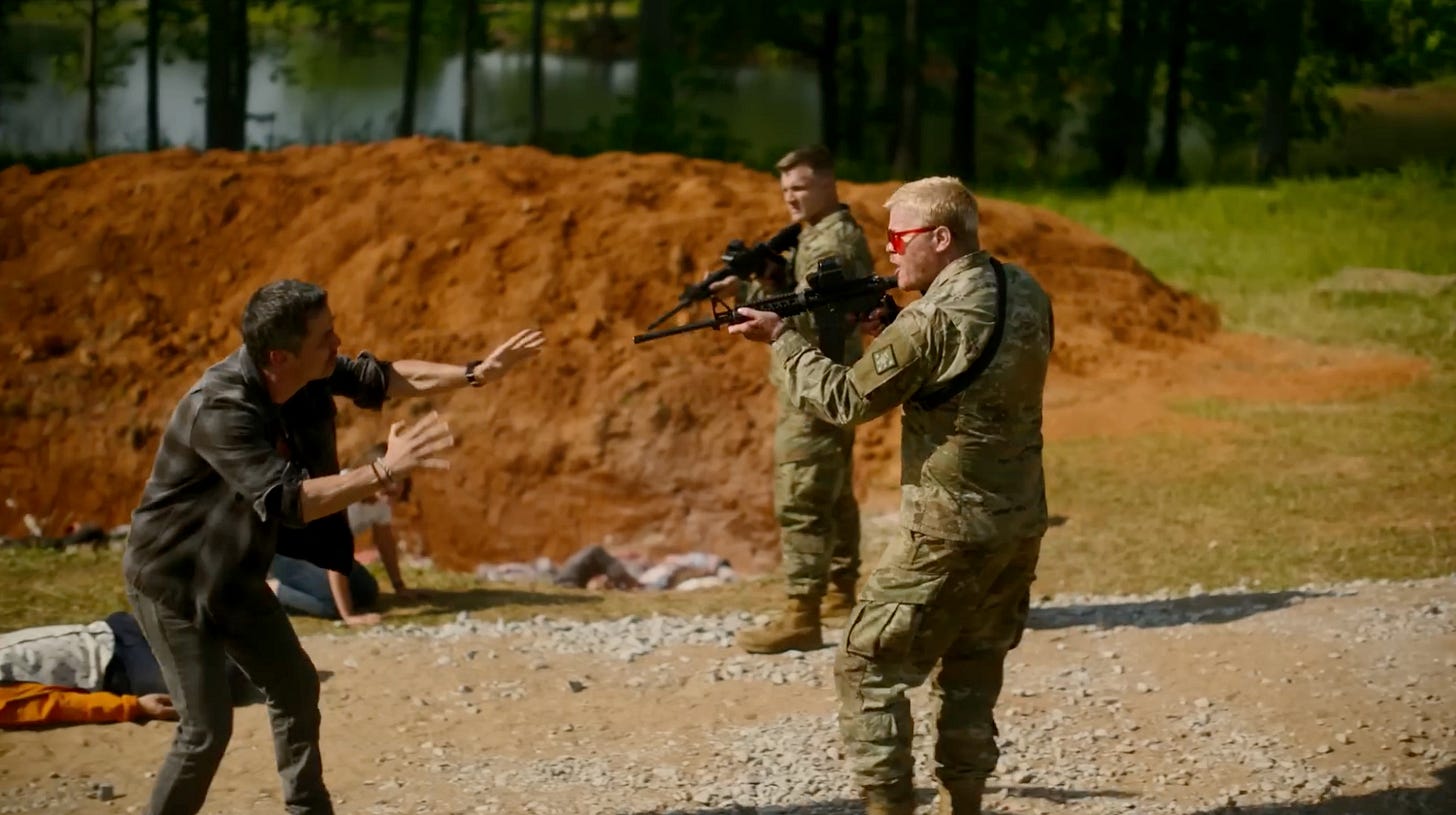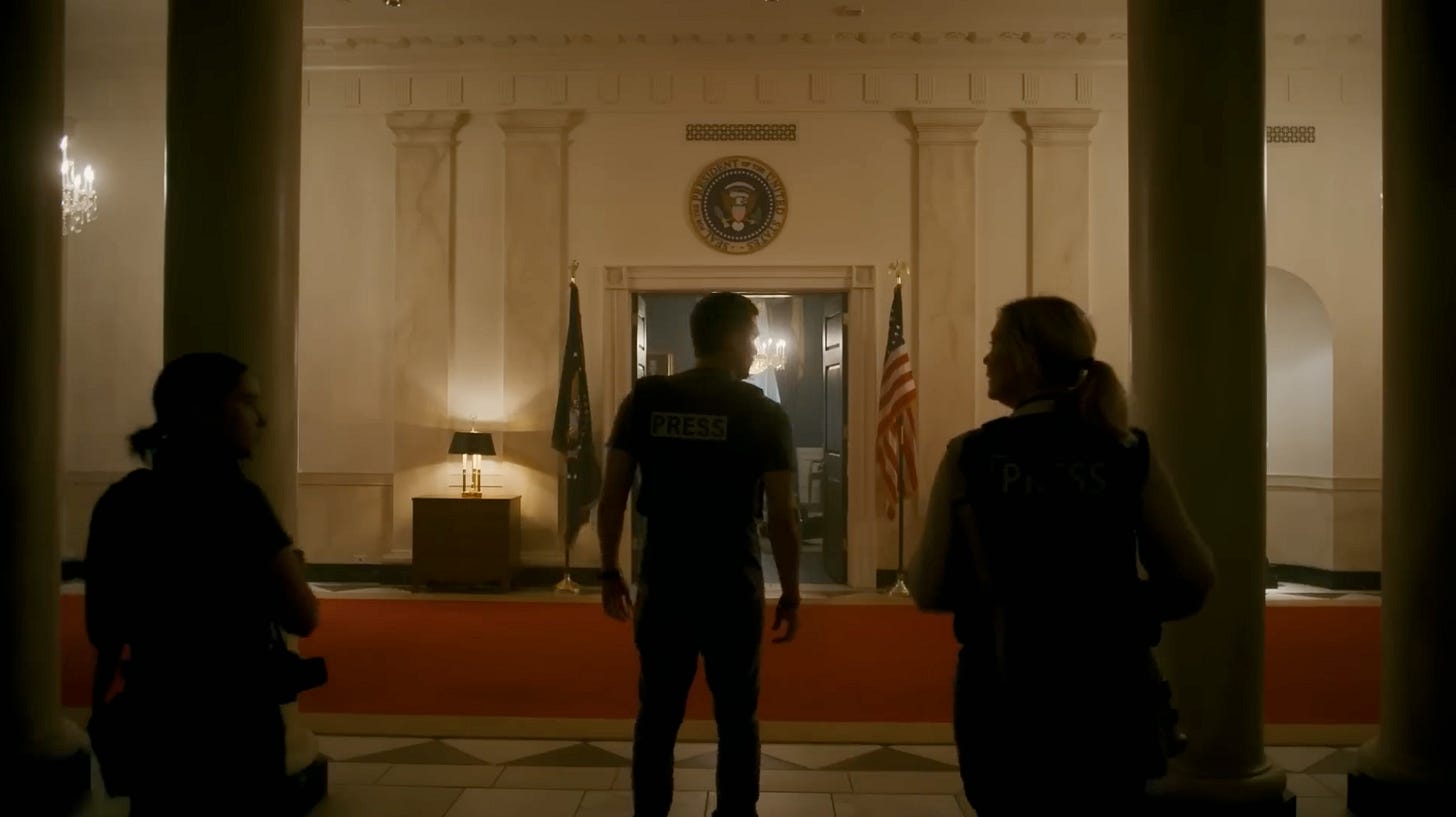Before you see "Civil War", read this
Few things help sell a movie like a sense of mystery. Civil War has had plenty of that, with rave reviews mixed with unanswered questions. Writer/director Alex Garland says he intentionally left a lot to the audience’s imagination & interpretation. Still, this film depicts a modern-day war between the states in unblinking, brutal detail. The mystery of how it deals with these tough themes is best solved by seeing it.
But should you? Here are a few things to bear in mind before you buy your ticket.
1. Civil War is about journalists.
Kirsten Dunst, Wagner Moura, Cailee Spaeny and Stephen McKinley play a group of journalists who cover this war by embedding with (and sometimes running from) the Americans in the fight. The story is not told through the eyes of the combatants, although we get to know them in very unsettling ways.
This movie doesn’t glorify reporters, but it will give you a sense of how it feels to be a civilian risking death to document reality. The only things our heroes shoot are photos, many of which help tell the story. It may be tempting to assume the movie is making them out to be more noble than they are, but I’ve been a journalist for more than 20 years. I would’ve made some of the exact same decisions the main characters made, especially at the final battle. To me the four main characters represent the various moods, motivations and perspectives that many journalists bring to their work.
2. Civil War is about life going on.
The movie focuses on one of the two factions that have seceded from the United States to invade Washington, DC. Those factions, however, do not have control of the entire country: far from it. Many states are still part of the Union, and quite a few of them are not under fire. Civil War focuses on the Northeast, and the devastation you’ll see is all there. Some of it is urban decay; much of it is destruction and atrocity. Still, plenty of people are muddling through as best they can. Others seem to be going on with life as usual, the way you and I do right now. That may be one of the most startling aspects of this film… or one of the most reassuring. See what you think.
3. Civil War is visually breathtaking.
Garland and cinematographer Rob Hardy did an extremely good job with this film. It would’ve been easy to make a war epic about a ravaged America where everything looks like the game Call of Duty. Instead, the movie alternates between uncomfortably close brushes with human suffering, wide vistas with sharp scars of destruction (some of which are almost ethereal and soft), and absolutely bizarre settings that could only happen in this insane situation. There’s urban combat, fighting in leafy green fields and a lot in between. War makes people do atrocious things, and this movie shows that very clearly. The climactic fight for the White House is… well, let’s say if you’ve ever played Call of Duty you’ll feel it in a very different way.
4. Civil War is horrifically brutal.
It’s one thing to see war crimes committed in distant lands. When Americans do them to each other, it hits much harder. Some of the shots in this movie bent my brain by forcing me to remember, “Holy crap, that’s Pennsylvania.”
This isn’t an especially gory film, but there is a lot of blood. Dead bodies are everywhere. There were moments where I focused in on part of a shot, thinking What is that?, only to regret my curiosity. Please bear this in mind if you see this movie with children, or with anyone who may be traumatized by senseless brutality. Though, to be fair, the way some shots are composed guide your eye in a way that shows just how brilliant Garland and Hardy are.
5. Civil War should not be seen alone. Go with someone else.
This movie probably interests you because of what it has to say about America today, especially our political divides. It will give you plenty to talk about, whether you like the film or not. There are so many things to discuss afterward: the role of the president, the motivations of the fighters, the backstory of how the war started, each main character’s reasons for their choices, how & why people stay away from the fighting, what happens after this war ends, etc.
I watched the film by myself. Huge mistake. I left the movie theater around 11:00 pm. My mind was racing until 2:30 am. No nightmares, thankfully, but a torrent of thoughts and critiques and questions and reactions. Seriously, see this with someone you enjoy talking to. Plan a good restaurant for a post-movie debrief.
…and treat yourself to dessert. After watching this movie, you might need it.
Let me know what you thought of the film in the comments. And here’s a link to my full-spoiler review of Civil War.








I haven’t seen the movie yet and appreciate the recommendation to see it with someone.
I do wonder what today’s Ukrainians might think about our reaction to the movie. They’re living it now, right? And what makes anyone think it won’t happen here? Is it arrogance or naïveté?
My thought is that no one thinks it will happen until it does. Europe in the 1939s might like to have a word.
I’m also curious about our armed services people. What are their reactions to this movie?
There is no chance that I will go see this movie - I simply don't like war movies. But all the hype has made me curious not curious enough to see it but curious to wonder what others see or don't see in it. Thanks for the advance discussion.